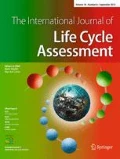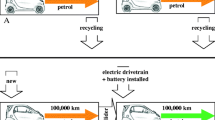Abstract
Purpose
Innovative fuel efficiency technologies as for example electrification and lightweight materials typically lead to a shift of emissions from the use phase to the production phase of a vehicle. Whether the efforts of applying sophisticated fuel saving technologies pay back in environmental terms over the products’ lifetime depends directly on the lifetime mileage assumed. Currently, different “educated guess” values of industry associations and car manufacturers ranging from 150,000 to 300,000 km are applied in automotive life cycle assessment (LCA). This study improves the database for LCA practitioners in the automotive industry by statistically determining empirical lifetime mileage values for different types of passenger cars.
Methods
The analysis of different data sets of a sample of more than 800,000 vehicles in Germany is performed by using statistical techniques. Firstly, survival analysis is used to describe the typical lifetime of passenger cars by using the Weibull distribution. Secondly, regression analysis is used to describe the progression of mileage during the course of a car’s life. The analysis differentiates eight different segments from urban small cars (A000) over midsized cars (A00, A0, A, B, C, D) to ultra luxury cars (E) as well as Otto and diesel engines.
Results and discussions
The results show varying lifetimes and mileages of passenger cars depending on the engine type and vehicle segment. Many decisions on innovative automotive technologies are independent from the engine type. In this case, the recommendation of the authors is to differentiate between three different groups of segments (A00/A0, A/B, C) with mileages going from 170,000 over 200,000 to 230,000 km. There might even be cases where the usage of a segment-specific value is not recommended. In such cases, the average value of the obtained results of 200,000 km appears as feasible choice. Even though the primary data are from Germany only, it is assumed that the results obtained in this study can be used as a proxy estimate for the geographical area of Europe.
Conclusions
The results of this paper can be used as default values for LCA practitioners performing automotive LCAs as they provide evidence-based values of passenger cars’ lifetimes and mileages in a disaggregated way. The previously often used assumption of 150,000 km based on educated guess represents an underestimated value and should be replaced by the data obtained in this study. Using the proposed lifetime mileage data improves the validity and representativeness of automotive LCAs in Europe.






Similar content being viewed by others
Notes
R. L. Polk & Company prepared and provided information with automotive focus. In July 2013, Polk became part of the IHS Automotive Company.
References
Atkas CB, Bilec MM (2012) Service life prediction of residential interior finishes for life cycle assessment. Int J Life Cycle Assess 17(3):362–371
Bafa (2010) Abschlussbericht - Umweltprämie. Available at www.bafa.de/bafa/de/wirtschaftsfoerderung/umweltpraemie/publikationen/ump_abschlussbericht.pdf. Accessed 11 May 2015
Bertsche B, Lechner G (2004) Zuverlässigkeit im Fahrzeug- und Maschinenbau, 4th edn. Springer, Berlin
Daimler (2010) Environmental Certificate Mercedes-Benz CLS-Class. Available at www.daimler.com/Projects/c2c/channel/documents/2003765_Environmental_Certificate_Mercedes_Benz_CLS.pdf. Accessed 11 May 2015
Daimler (2012) Environmental Certificate Mercedes-Benz A-Class. Available at www.daimler.com/Projects/c2c/channel/documents/2240746_Environmental_Certificate_Mercedes_Benz_A_Class.pdf. Accessed 11 May 2015
Daimler (2013) Environmental Certificate Mercedes-Benz S-Class. Available at www.daimler.com/Projects/c2c/channel/documents/2373360_Environmental_Certificate_Mercedes_Benz_S_Class.pdf. Accessed 11 May 2015
Dominskyt S (2012) Tachomanipulation Krimineller Volkssport Wie aus einem Kavaliersdelikt ein “krimineller Volkssport” wurde. Gebrauchtwagen-Prax 1:13–15
ELV Directive (2013) End-of-life vehicle reuse/recycling/recovery rates in Germany for 2011 pursuant to Art. 7 (2) of the End-of-Life Vehicles Directive 2000/53/EC. Available at www.bmub.bund.de/fileadmin/Daten_BMU/Download_PDF/Abfallwirtschaft/jahresbericht_altfahrzeug_2011_en_bf.pdf. Accessed 11 May 2015
European Commission (2009) State aid N 674/2008 - Slovakia - LIP - Volkswagen Slovakia. Available at http://ec.europa.eu/competition/elojade/isef/index.cfm?clear=1&policy_area_id=3. Accessed 11 May 2015
Finkbeiner M (2011) Towards life cycle sustainability management. Springer, Berlin, ISBN: 978-94-007-1898-2
Finkbeiner M (2013) From the 40s to the 70s—the future of LCA in the ISO 14000 family. Int J Life Cycle Assess 18(1):1–4
Finkbeiner M (2014a) Product environmental footprint—breakthrough or breakdown for policy implementation of life cycle assessment? Int J Life Cycle Assess 19:266–271
Finkbeiner M (2014b) The international standards as the constitution of life cycle assessment: the ISO 14040 series and its offspring. In: Klöpffer W (ed) Background and future prospects in life cycle assessment. LCA compendium—the complete world of life cycle assessment. Springer, Netherlands, pp 85–106
Finkbeiner M, Inaba A, Tan RBH, Christiansen K, Klüppel H-J (2006a) The new international standards for life cycle assessment: ISO 14040 and ISO 14044. Int J Life Cycle Assess 11(2):80–85
Finkbeiner M, Hoffmann R, Ruhland K, Liebhart D, Stark B (2006b) Application of life cycle assessment for the environmental certificate of the Mercedes-Benz S-class. Int J Life Cycle Assess 11:240–246
Galatola M, Pant R (2014) Reply to the editorial “Product environmental footprint—breakthrough or breakdown for policy implementation of life cycle assessment?” written by Prof. Finkbeiner (Int J Life Cycle Assess 19(2):266–271). Int J Life Cycle Assess 19:1356–1360
ISO 14040 (2006) Environmental management—life cycle assessment—principles and framework. Geneva, Switzerland
ISO 14044 (2006) Environmental management—life cycle assessment—requirements and guidelines. Geneva, Switzerland
KBA (2012) Besitzumschreibungen im Jahr 2012 nach Fahrzeugklassen. Available at http://www.kba.de/DE/Statistik/Fahrzeuge/Besitzumschreibungen/FahrzeugklassenAufbauarten/2012/2012_u_fzkl_eckdaten_absolut.html?nn=742766. Accessed 11 May 2015
Klein JP, Moeschberger ML (1997) Survival analysis. Springer, New York
Kleinbaum DG, Klein M (2012) Survival analysis: a self-learning text, 3rd edn. Springer, New York
Koffler C, Rohde-Brandenburger K (2010) On the calculation of fuel savings through lightweight design in automotive life cycle assessments. Int J Life Cycle Assess 15:128–135
Krinke S, Koffler C, Deinzer G, Heil U (2010) Automobiler Leichtbau unter Einbezug des Gesamten Lebenszyklus (An integrated life cycle approach to lightweight Automotive design). ATZ Automobiltechnische Zeitschrift 112:36–42
Mehlhart G, Merz C, Akkermans L, Jordal-Jorgensen J (2011) European second-hand car market analysis. Available at www.oeko.de/oekodoc/1114/2011-005-en.pdf. Accessed 11 May 2015
Minkov N, Schneider L, Lehmann A, Finkbeiner M (2015) Type III environmental declaration programmes and harmonization of product category rules: status quo and practical challenges. J Cleaner Prod 94:325–246
Statista (2012) Europäische Union: Bevölkerungsdichte in den Mitgliedsstaaten im Jahr 2012 (in Einwohner pro Quadratkilometer). Available at http://de.statista.com/statistik/daten/studie/74693/umfrage/bevoelkerungsdichte-in-den-laendern-der-eu/. Accessed 11 May 2015
Volkswagen (2012) The Golf Environmental Commendation. Available at http://en.volkswagen.com/en/company/responsibility/service/download/download.html#/tab=ee2dba55137b7c2a9ea91d641967922c. Accessed 11 May 2015
Wang KS, Hsu FS, Lui PP (2001) Modeling the bathtub shape hazard rate function in terms of reliability. Reliab Eng Syst Saf 75:397–406
Weibull W (1951) A statistical distribution function of wide applicability. J Appl Mech 18:293–297
Wilker H (2010) Band 3: Weibull-Statistik in der Praxis: Leitfaden zur Zuverlässigkeitsermittlung technischer Komponenten, 2nd edn. Books on Demand, Norderstedt
Xie M, Lai CD (1995) Reliability analysis using an additive Weibull model with bathtub-shaped failure rate function. Reliab Eng Syst Saf 52:87–93
Acknowledgments
The authors would like to thank Autoscout24 GmbH for the helpful support. We are also grateful to the companies of DEUMU and Resebeck for the insights into the current practice of discarding cars.
Author information
Authors and Affiliations
Corresponding author
Additional information
Responsible editor: Wulf-Peter Schmidt
Rights and permissions
About this article
Cite this article
Weymar, E., Finkbeiner, M. Statistical analysis of empirical lifetime mileage data for automotive LCA. Int J Life Cycle Assess 21, 215–223 (2016). https://doi.org/10.1007/s11367-015-1020-6
Received:
Accepted:
Published:
Issue Date:
DOI: https://doi.org/10.1007/s11367-015-1020-6




